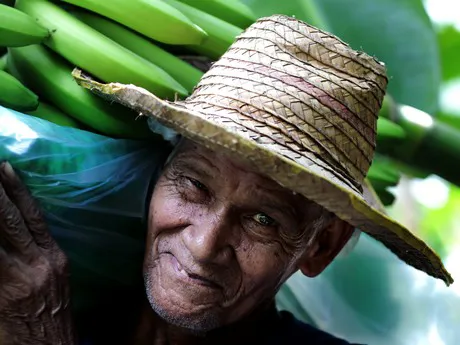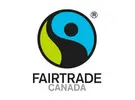It’s hard to imagine a world without bananas, but a variety of challenges have put the fruit in a precarious position. Behind the Peel, a new campaign from Fairtrade Canada, explores the hidden costs and environmental threats to the banana industry and how shoppers can take action.

Bananas are Canada’s top fruit, representing over 20 percent of all fresh fruit imports, but a virulent plant-destroying fungus threatens the global supply. Fusarium TR4, or Panama disease, was recently found on two farms in Colombia. The disease has ravaged farms and plantations in Asia and Australia for decades. If it gains a foothold in Latin America, up to 80 percent of the world’s export-ready bananas are at risk.
Because of the way they are bred, all bananas are almost genetically identical. Industrial farms, and many small farmers practice a hyper-vigilant form of monoculture farming that relies heavily on fertilizer, pesticides and other inputs to maximize production and minimize loss. This makes them particularly susceptible to pests and diseases like TR4.
Grocery stores often employ bananas as loss leaders with artificially low prices to attract consumers. Achieving these low prices often means externalizing costs and pushing them further down the supply chain. This tactic results in a cascade of negative consequences for people and the environment. It also limits the amount of resources available to invest in better practices that could limit the spread of diseases like TR4.
Fairtrade conducted a study with True Price and Trucost to compare the external costs of conventional production with bananas produced as Fairtrade. The hidden costs in the banana sector amounted to an average of $6.70 dollars per box (one box is equal to 18.14 kilograms). Much of this is due to externalized social costs, including inadequate wages, lack of social security for workers, and inadequate income for small farmers. The largest environmental costs are land use, water exhaustion, and climate change. Fairtrade bananas were found to have average external costs of $3.65 per box of bananas, an average of 45 percent less than the sector.
“We’ve been shortchanging the far end of our supply chains for far too long and the rise of TR4 now threatens not just our access to bananas, but the livelihoods of millions of people across Latin America,” Francoeur added.
The study concludes that the banana sector can dramatically improve sustainability by reducing external costs and reliance on input-intensive, monoculture production. The Productivity Improvement Program, managed by Fairtrade’s Latin American producer network CLAC, helps farmers improve soil health to maintain productivity, reduce input costs, and manage the risk from pests and disease.
Companies can also learn from practices required in the Fairtrade Standards, such as payment of fairer wages/prices, investment in community programs, creation of safe and healthy workplaces, transparent negotiations, and respect for human rights.
Fairtrade Canada’s Behind the Peel campaign launches September 23rd.
For more information: 
Fairtrade Canada
Tel: +1 613 563 3351
Email: info@fairtrade.ca
www.behindthepeel.com
www.fairtrade.ca
